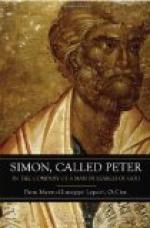It came, then, to this, that he had not so much changed towards Hilda as changed towards life. Whether he had really fundamentally changed in such a way that a break with the old was inevitable he did not know. Till then Hilda was part of the old, and if he went back to it she naturally took her old place in it. If he did not—well, there he invariably came to the end of thought. Curiously enough, it was when faced with a mental blank that Julie’s image began to rise in his mind. If he admitted her, he found himself abandoning himself to her. He felt sometimes that if he could but take her in his arms he could let the world go by, and God with it. Her kisses were at least a reality. There was neither convention nor subterfuge nor divided allegiance there. She was passion, naked and unashamed, and at least real.
And then he would remember that much of this was problematical after all, for they had never kissed as that passion demanded, or at least that he had never so kissed her. He was not sure of the first. He knew that he did not understand Julie, but he felt, if he did kiss her, it would be a kiss of surrender, of finality. He feared to look beyond that, and he could not if he would.
He wrote, then, to Hilda, and he told of the death of Jenks, and of their arrival in Abbeville, “You must understand, dear,” he said, “that all this has had a tremendous effect upon me. In that train all that I had begun to feel about the uselessness of my old religion came to a head. I could do no more for that soul than light a cigarette.... Possibly no one could have done any more, but I cannot, I will not believe it. Jenks was not fundamentally evil, or at least I don’t think so. He was rather a selfish fool who had no control, that is all. He did not serve the devil; it was much more that he had never seen any master to serve. And I could do nothing. I had no master to show him.
“You may say that that is absurd: that Christ is my Master, and I could have shown Him. Hilda, so He is: I cling passionately to that. But listen: I can’t express Him, I don’t understand Him. I no longer feel that He was animating and ordering the form of religion I administered. It is not that I feel Anglicanism to be untrue, and something else—say Wesleyanism—to be true; it is much more that I feel them all to be out of touch with reality. That’s it. I don’t think you can possibly see it, but that is the main trouble.
“That, too, brings me to my next point, and this I find harder still to express. I want you to realise that I feel as if I had never seen life before. I feel as if I had been shown all my days a certain number of pictures and told that they were the real thing, or given certain descriptions and told that they were true. I had always accepted that they were. But, Hilda, they are not. Wickedness is not wicked in the way that I was told it was wicked, and what I was told was salvation is not the salvation men and women want. I have been playing in a fool’s paradise all these years, and I’ve got outside the gate. I am distressed and terrified, I think, but underneath it all I am very glad....




